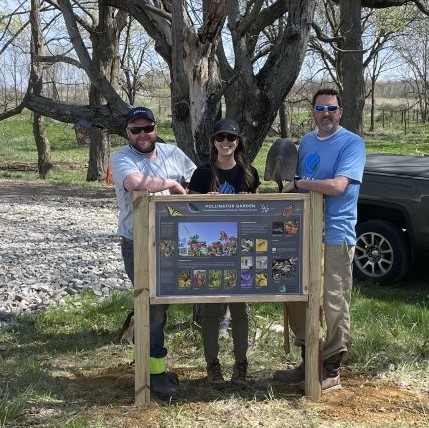Olympus demonstrated its commitment to environmental stewardship by achieving Wildlife Habitat Council (“WHC”) Conservation Certification for its pollinator garden and wildlife habitat enhancement on property located in Penn Township, PA, near its Gaia Well Pad.
The Gaia Pad Project was designated as Certified Silver, signifying leadership among the over 600 WHC Conservation Certification programs. Programs are given a Certified, Silver Certified or Gold Certified designation.
During 2022, the Olympus team planted a pollinator garden and installed bat boxes, which were built by the Jeanette and Penn Trafford School District Area Scouting Organizations. Nursery-grown native plant species and seeds that attract pollinator species were planted by Olympus employees and volunteers from Groundwater and Environmental Services (“GES”). Additionally, Olympus participated in the Pennsylvania Game Commission’s annual turkey population survey, as well as identifying and removing the highly invasive Spotted Lanternfly.
“The Gaia Pad Project is recognized as meeting the strict requirements of WHC Conservation Certification,” said Margaret O’Gorman, President, WHC. “Companies achieving WHC Conservation Certification, like Olympus Energy, are environmental leaders, voluntarily managing their lands to support sustainable ecosystems and the communities that surround them.”
“Olympus is committed to serving as a steward of the communities where we operate, while we responsibly develop natural gas resources,” said Tim Dugan, President and CEO of Olympus Energy. “One of the key pillars in our Environmental, Social, Governance Program is Minimizing Surface Impacts. Projects like our Gaia Pad Project allow us to go one step further and improve the habitat surrounding our locations. Olympus is proud of this certification and our focus on excellence.”
Wildlife Habitat Council promotes and certifies habitat conservation and management on corporate lands through partnerships and education. WHC Conservation Certification programs take corporate sustainability goals and objectives and translate them into tangible and measurable on-the-ground actions. Through a focus on building collaboration for conservation with corporate employees, other conservation organizations, government agencies, and community members, WHC programs focus on healthy ecosystems and connected communities. WHC-assisted wildlife habitat and conservation education programs are found in 48 states and 24 countries. www.wildlifehc.org

